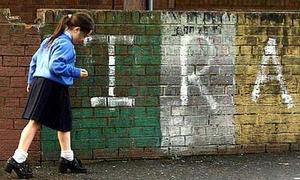Resurgent Irish terrorism on agenda North and South
Irish politicians on both sides of the border say resurgent Republican terrorism is a growing problem; tensions grown as community leaders charge that the Northern Irish police have turned a blind eye to the killing of a Belfast man by the Protestant Ulster Volunteer Force (UVF); intelligence sources say the UVF leadership authorized the killing because the man “had flouted their authority”

Concern over the return of the "Troubles" // Source: wordpress.com
A meeting in Dublin the other day is putting republican terrorism back in focus while in Belfast, the Stormont justice minister David Ford has gone public to deny that the Police Service of Northern Ireland (PSNI) have turned a blind eye to the Ulster Volunteer Force (UVF) killers of Shankill Road loyalist, Bobby Moffett.
The Executive politician’s comments came after last week’s Independent Monitoring Commission (IMC) findings that Moffett’s murder on the Shankill Road in May was actually sanctioned by the leadership of the UVF.
“I don’t think there’s any question of the police turning a blind eye, as I understand it, the police are investigating the murder of Bobby Moffett as they investigate all serious crimes. I think the issue is, what is the UVF leadership up to? We’ve seen that the IMC has not yet recommended specifications by the Secretary of State of the UVF but it is absolutely clear the UVF now has to show that it is on the path that it claims to be on,” he added.
4NI reports that the Independent Monitoring Commission’s report called Bobby Moffett’s murder a public execution. They said it was ordered by UVF leaders who thought “he had flouted their authority.”
Meanwhile, there has been a separate call for cross-border policing cooperation to be stepped up to combat dissident republicans. The SDLP leader Margaret Ritchie and Deputy Leader Patsy McGlone met Irish prime minister Brian Cowen on the issue.
“Our most immediate concern is the rise in dissident violence,” she said, noting that it was “an attack on Irish democracy north and south.”
The SDLP boss also criticized the performance of the U.K. security service, MI5, in combating dissidents in Northern Ireland. “We believe that the transfer of intelligence primacy from the PSNI to MI5 in 2007 was a mistake and a failure,” Ritchie said.
On a more positive note, however, she said that the Irish police continue to frustrate dissident operations and make arrests based on high-grade intelligence. “We will be telling the Taoiseach that we believe the time has come to step up cross-border policing co-operation and give it practical and visible outcomes, particularly in border areas,” she said.
“It is important that such security and policing co-operation should be built up in a broader context. The existing cross-border bodies set up under the Good Friday Agreement address a narrow range of activities and we would like to see these expanded. However, it is important that the mutual benefits are known throughout the island of Ireland.”
In advance of the event, she concluded: “The profile of North South co-operation is generally low in the south and we hope the government might address this problem.”
Last Thursday, the head of MI5 warned that the United Kingdom was facing a wave of terrorist attacks from jihadists and a resurgent IRA (“MI5: U.K. facing a new wave of terrorist attacks from jihadists, IRA,” 17 September 2010 HSNW
